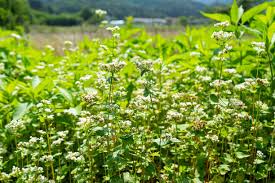Buckwheat (Fagopyrum esculentum), a fast-growing, non-grain plant, provides an array of benefits for gardeners. Though it produces nutritious, triangular seeds, its value extends beyond just being a food crop. This remarkable plant serves as a green manure, attracts beneficial insects, suppresses weeds, and enriches compost. Whether in small or large plantings, growing buckwheat can enhance both garden health and soil quality.
Attracting Beneficial Insects and Pest Control
One of the key advantages of planting buckwheat is its ability to attract a wide range of beneficial insects, including pollinators like honeybees. But buckwheat’s biggest asset in pest control lies in its ability to support hoverflies (Syrphid flies). These insects are highly effective predators of aphids and other small, soft-bodied pests that often damage vegetables such as potatoes, broccoli, and green beans. By providing hoverflies with a constant nectar supply, buckwheat helps keep pest populations in check.
Research has shown that growing buckwheat near vegetable crops—within 20 feet (6 meters)—can effectively deter pests. Its shallow roots make it easy to pull up, and planting buckwheat alongside crops like potatoes or strawberries can create a beneficial ecosystem. A few weeks after sowing, buckwheat can go from seed to bloom, producing flowers that attract hoverflies and other helpful insects.
Using Buckwheat for Weed Control
Buckwheat’s rapid growth is a valuable asset for weed suppression. Its dense foliage shades the ground, preventing many common weeds from germinating. For example, buckwheat helped me eliminate a particularly stubborn patch of field bindweed (Convolvulus arvensis)—a perennial weed that spreads through roots and seeds. By growing buckwheat as a cover crop, I successfully smothered the bindweed, significantly reducing its presence.
In addition to shading weeds, buckwheat plants release natural compounds through their roots that inhibit weed seed germination. When buckwheat is pulled at the end of the season, these compounds act as a natural herbicide, further helping to prevent future weed growth.

Improving Soil Health
Buckwheat is a powerful tool for improving soil quality, particularly in its ability to enhance nutrient availability. Soils that are rich in organic matter often contain phosphorus and calcium in forms that plants cannot easily access. Buckwheat acts as a “phosphorus pump,” absorbing these nutrients and making them more available to other plants when it decomposes. This ability makes buckwheat an excellent choice for gardeners looking to enrich their soil organically.
Additionally, when incorporated into compost piles, buckwheat adds bulk and accelerates decomposition, enriching the compost with nutrients that benefit future crops.

Growing Buckwheat: Tips and Considerations
Buckwheat is a hardy plant that thrives in warm weather, making it suitable for short-season climates. Originally domesticated over 3,000 years ago in China, it has since spread across Russia and Europe. You can plant buckwheat after your last frost date, and it grows particularly well when sown in late spring or early summer, producing taller plants than those planted later in the season.
Buckwheat is easy to grow, and its rapid growth cycle—from seed to bloom in just over a month—means it can be a fast-turnaround crop for a garden. Although some farm advisory bulletins caution that buckwheat can become weedy, I’ve found that in an organic garden, it’s easy to manage and pull up before it produces mature seeds. Volunteer plants are also easy to remove.
Buckwheat seeds are widely available, typically sold by most seed companies as cover crop seeds. You can also find them at farm supply stores or health food stores, where buckwheat groats—hulled seeds—are available for sprouting. However, be cautious not to confuse sprouting seeds with toasted groats, as the latter will not germinate.
Conclusion
Whether used for pest control, weed suppression, or soil improvement, buckwheat is a versatile and valuable crop for any garden. Its ability to attract beneficial insects, enhance soil nutrients, and suppress weeds makes it an indispensable tool for organic gardeners. Buckwheat’s quick growth and ease of management allow gardeners to reap its benefits with minimal effort. If you’re looking to boost your garden’s health naturally, consider sowing buckwheat—you’ll be rewarded with both a thriving ecosystem and improved soil.
